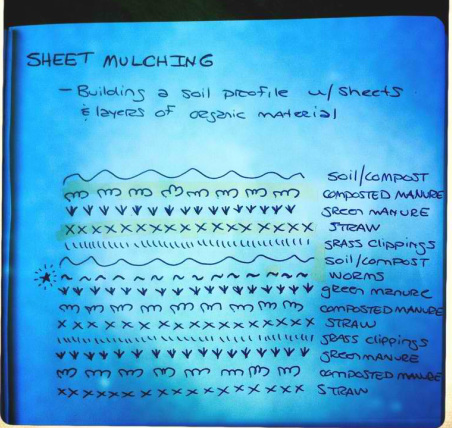
Leading the workshop was permaculturist, Jerome Ostenowski with the Central Rocky Mountain Permaculture Institute in Basalt, CO. Jerome had us up and out of our chairs in under an hour digging in the dirt and planting tropical plants of banana and papaya in Growing Spaces newest dome demo. These "Growing Spaces" are so amazing that you can grow tropical plants in the mountain climates!
Before the trees went in the ground, we had to "make the bed" using a fascinating and simplistic method called "sheet mulching." Some people call it a "lasagna bed" because you create a soil profile by layering a combination of organic materials alternating layers between browns (carbon) and greens (nitrogen). There are different theories on what ingredients you can use. Some allow newspaper and cardboard as a brown, carbon source. But for this exercise, we are going to keep it strictly organic. Sheet mulching is not only fun and easy but reduces the cost of buying a whole truckload of gardening soil. Many of the items can be sourced from your own yard (grass clippings, green manure) or acquired for FREE from local sources (composted manure and straw).
Above is a diagram I wrote in my notebook as the layers went into the bed. You can see how you start with a bulky carbon source on the bottom and begin stacking 3-4" layers repeating the process every 4-5 layers till the bed is full. Give the stacking a good soak every four layers too. Get rev up the mA few tips:
- Composted manure - composted manure means it is mature livestock poop and has been sitting for at least 3-years. It ensures that all the weed seeds have died and other bacterias have as well. You can find this locally from a farm. Try and get horse or chicken manure. And if unsuccessful, you can buy bags of chicken manure at a local plant nursery.
- Grass clippings - use clean grass clippings without a lot of other debris and that has not been treated with synthetic, chemical fertilizers
- Green Manure - this is yard and garden trimmings. It could be tall grasses from the side yard or discarded plant residue from the garden. Just be sure to not grab grasses that have gone to seed.
- Worms - you can order worms online or buy locally at a nursery. Best to get composting red worms versus earthworms.
- Soil/compost - Buy good organic soil or compost versus native soil but native soil is fine too because it will be so well amended with all the other ingredients.

 RSS Feed
RSS Feed
